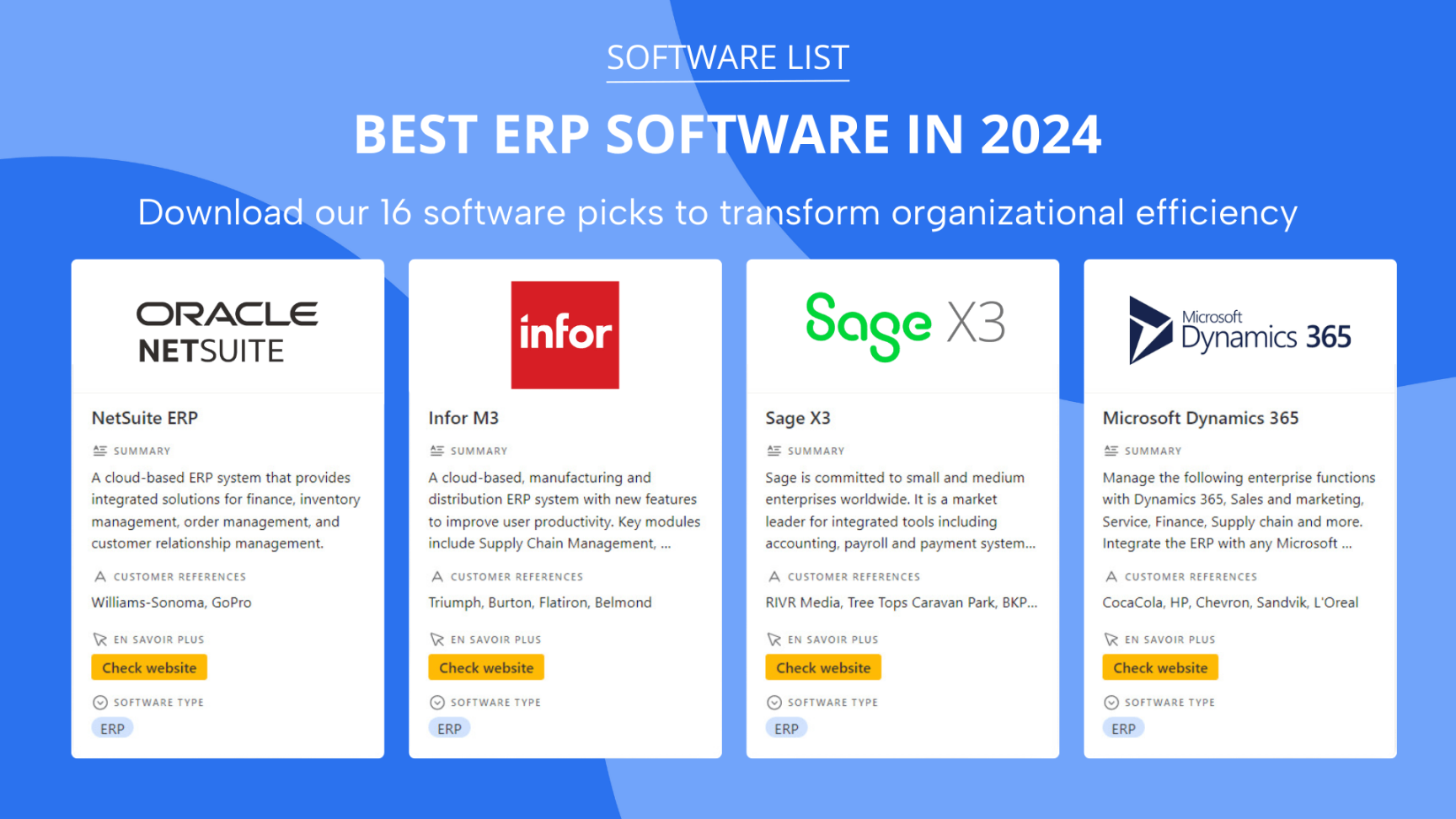In today’s competitive business landscape, streamlining operations and maximizing efficiency are crucial for success. This is where Enterprise Resource Planning (ERP) systems come into play. ERP systems function as the central nervous system of a business, integrating and automating core processes across various departments like finance, accounting, inventory management, human resources, and customer relationship management.
Choosing the Right ERP System: A Maze of Options

ERP systems come in a variety of shapes and sizes, catering to businesses of all sizes and industries. Selecting the right one requires careful consideration of your specific needs and budget. Here, we’ll delve into some of the most popular ERP systems, highlighting their strengths and target audiences.
Oracle NetSuite: The All-Around Powerhouse
Oracle NetSuite is a cloud-based ERP system renowned for its scalability and robust functionality. It offers a comprehensive suite of applications encompassing finance, inventory, CRM, and project management. NetSuite caters well to medium and large businesses across various industries, particularly those seeking a unified platform for all their core operations. Its robust reporting and analytics capabilities provide valuable insights to make data-driven decisions. However, NetSuite’s pricing structure can be on the higher end, making it less suitable for smaller businesses with limited budgets.
Microsoft Dynamics 365: A Familiar Embrace for Microsoft Users
Microsoft Dynamics 365 is another popular cloud-based ERP solution. It integrates seamlessly with other Microsoft products like Office 365 and Power BI, offering a familiar user experience for businesses already invested in the Microsoft ecosystem. Dynamics 365 offers a modular approach, allowing businesses to choose the specific applications they need, such as finance, supply chain management, or customer service. This flexibility makes it a good fit for businesses of various sizes, from growing startups to established enterprises.
SAP S/4HANA: The Enterprise Go-To
SAP S/4HANA is a powerful ERP system designed for large enterprises with complex operations. It leverages in-memory computing technology for real-time data processing and analytics, providing businesses with a comprehensive view of their operations. SAP S/4HANA offers a wide range of industry-specific solutions, making it a strong choice for businesses in sectors like manufacturing, healthcare, and retail. However, its complexity and cost can be a barrier for smaller businesses. Implementing and maintaining SAP S/4HANA often requires specialized expertise, adding to the overall investment.
Other Notable ERP Systems
The ERP landscape extends beyond these giants. Here’s a glimpse into some other noteworthy options:
Sage Intacct: A cloud-based ERP system known for its robust accounting features, ideal for mid-sized businesses with a focus on finance.
- Acumatica Cloud ERP: A user-friendly ERP system offering a flexible and customizable platform for businesses seeking a modern and scalable solution.
- Odoo: An open-source ERP system gaining traction for its affordability and customizability. It’s a good option for businesses with unique needs and the in-house development resources to tailor the system.
Choosing the Right Fit: It’s All About Your Needs
Selecting the right ERP system is an investment in your business’s future. There’s no one-size-fits-all solution. Carefully evaluate your specific requirements, budget, and technical expertise before making a decision. Consider factors like industry-specific functionalities, scalability, ease of use, and integration capabilities with existing systems.
Benefits of Implementing an ERP System
The advantages of implementing an ERP system are numerous. Here are some key benefits:
Improved Efficiency: Streamlined workflows and automated processes lead to significant time and resource savings.
- Enhanced Data Visibility: Real-time access to consolidated data across departments empowers better decision-making.
- Increased Collaboration: Improved communication and information sharing between departments fosters a collaborative work environment.
- Improved Customer Service: Streamlined operations and inventory management lead to faster order fulfillment and enhanced customer satisfaction.
- Reduced Costs: ERP systems can help businesses optimize inventory levels, reduce operational costs, and improve resource utilization.
Implementation Considerations: Planning for Success
A successful ERP implementation requires careful planning and execution. Here are some key considerations:
Change Management: Implementing an ERP system can impact workflows and user habits. A well-defined change management strategy is crucial for user adoption and maximizing the system’s benefits.
- Data Migration: Migrating existing data to the new ERP system requires careful planning and data cleansing to ensure data accuracy and integrity.
- Integration: Ensure the new ERP system integrates seamlessly with existing business applications to avoid data silos and maintain a unified ecosystem.
- Training: Provide comprehensive training to all users on the functionalities and benefits of the new ERP system.